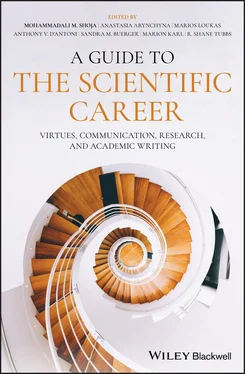1 ...8 9 10 12 13 14 ...51 23 Loyalty. Loyalty might seem odd in a list of attributes that contribute to success. However, having a positive orientation binds together those who share your passion and common interests. Goal orientation is made simpler with people along your path who share your passion; like‐minded people with common interests. This categorical devotion assists in interpersonal relationships that lead to success.
24 Self‐awareness and emotional intelligence. Introspection is important for knowing yourself, which is paramount when dealing with others and with changes along your path. Being able to empathize with others will not only make you a better leader, it will also help you to overcome failure and difficulty.
25 Authenticity. Being true to yourself alludes to the extent with which you are in congress with your values and personality, the content of your character. Authenticity is the ability to weather the external pressures that might stand in the way of your short‐term and long‐terms goals along your path to success.
26 Values. Values are a tricky category of ideas. They are formative and instructive; however, they also guide your decision‐making, goal orientation, and perseverance. Often, values refer to appropriate conduct and a life lived well. As values pertain to success, as with life, they are about being in congress with what matters to you.
1.4 Methods Are Conscious Actions One Should Take to Pave the Road to Success
1 Being visionary. Having vision is about seeing the path before you and setting short‐term and long‐term goals accordingly. Being a visionary is taking risks on the basis of this goal orientation when others might not otherwise do so.
2 Continuous learning and reflection. I have to distinguish two forms of learning here: active vs. passive. By passive learning, I mean taking the most out of one's mistakes and failures through reflection and trial‐and‐error. In contrast, active learning is achieved by constant reading, seeking advice from mentors and the experience of others who have been through a certain path. The point of active learning is to prevent errors and failures from happening and to minimize their negative influence if they strike. Reflect on your past experiences, learn from failure. Continual personal development and growth guides you to success.
3 Reach your potential and maximize it. Reaching your potential is more than living up to hype; it is about reaching your goals and then setting new ones. Also, understanding your strengths and maximizing them while hedging against your weaknesses allows you to realize what you are capable of achieving.
4 Respect your time. Time management is one of the least utilized, but most important, skills available to anyone pursuing success. Time is an artificial construct, but it cannot be replaced or caught up. You need to live in the moment and challenge yourself to make the most of the “now.”
5 Encourage a sense of urgency. As previously discussed, a sense of urgency needs to be encouraged because seeing the world as a series of goals is only useful if you are working toward them. Believing that the world will wait for your action misrepresents your agency in your success.
6 Establish priorities. Your time is valuable, and you need to learn to prioritize behaviors and goals relative to your definition of success. Prioritizing what matters to you means you are placing it first and making time for it.
7 Be selective. The things we don't do are often as important as or even more important than those we do. Be comfortable with saying no to something that is not vital to your goals.
8 Working hard and smart. Hard work does not mean working until you collapse. Efficiency matters, and being smart about the kind of work you engage in can help you achieve your goals better.
9 Do what is right. Don't ask for permission! There is an oft‐used phrase: It is better to ask for forgiveness than permission. The idea is simple. If you do what is right, this will lead you to the best possible action. Inaction is more detrimental that risking upsetting others.
10 Make good habits. Habits are the bricks and mortar of success. Habits are what create consistency and reaching long‐term (and short‐term) goals.
11 Keep a journal. Journaling is a long‐standing tradition, but for success specifically it is useful. Since we want success to be measurable, keeping a journal allows you to track your goals and amend them on the basis of changes you might see.
12 Think of new ideas and share them with others. There is an instinct to keep ideas to yourself because of theft, but the reality is that most people share similar ideas. And being able to share, amend, and synthesize fosters greater ideas that lead to innovation.
13 Don't hesitate to take action if you have an idea. Nothing is more satisfying for an intellectual person than learning, and nothing is more rewarding to him/her than taking into practice what has been learned.
14 Establish a meaningful network. Networking is more than making friends; it is about creating a web of resources, allies, and thought partners who can help you see the full distance to your definition of success.
15 Actively seek advice and constructive criticism. Ask for help. Part of establishing a network is having a group of people whom you can seek out for advice and criticism that can help carry you over slow periods on your path to success.
16 Get out of your comfort zone. Being comfortable is the enemy of success. If you are comfortable, you are no longer challenging yourself to overcome obstacles. A comfort zone is not about happiness, but about settling for what you have, not what you are seeking.
17 Adequately credit others for their contributions. Consider this a rule for yourself, an academic obligation or a divine responsibility. The importance of this in academic collaboration cannot be overstated.
18 Identify problems and offer solutions. Problem solving is an important component of long‐term and short‐term planning. Being able to see problems and offer solutions allows you to overcome pitfalls and adapt to a changing environment.
19 Demonstrate reasonable flexibility and regularly assess your personal development and growth. Adaptation is a big part of success, largely because life changes around you whether you want it to or not. Being flexible to changing circumstances allows you to assess where you are on your path to success.
20 Exercise regularly. Very successful people will appreciate how important a fit and healthy body is for a great mind. Exercise also allows you to focus and reduce anxiety, which are important when dealing with high‐stress situations that can arise in day‐to‐day business.
21 Don't give up. In many ways, perseverance and an attitude of not giving up might be the most important component of all. Innovation comes from going where others might not otherwise have gone. Even when times become hard, reassess and adapt in order to reach your definition of success.
1.5 Enhancers or Catalysts Are External Factors that Enhance One's Chance of Success
The right people foster teamwork . The right people share your passion, your interests, and your motivation to succeed. Build a network that allows you to succeed. This can include critics (who challenge you), mentors and role models (who guide and inspire you), friends (who support you), and family (who support you unconditionally).
1.6 Inhibitors Are Internal or External Factors that Diminish One's Chance of Success
1 Fear of success. Pursue whatever you wish without fear, or don't wish it at all. Fear stands in the way of your dreams and definition of success because it blocks out the ability to see exactly what you need to do and how far you have come.
Читать дальше












